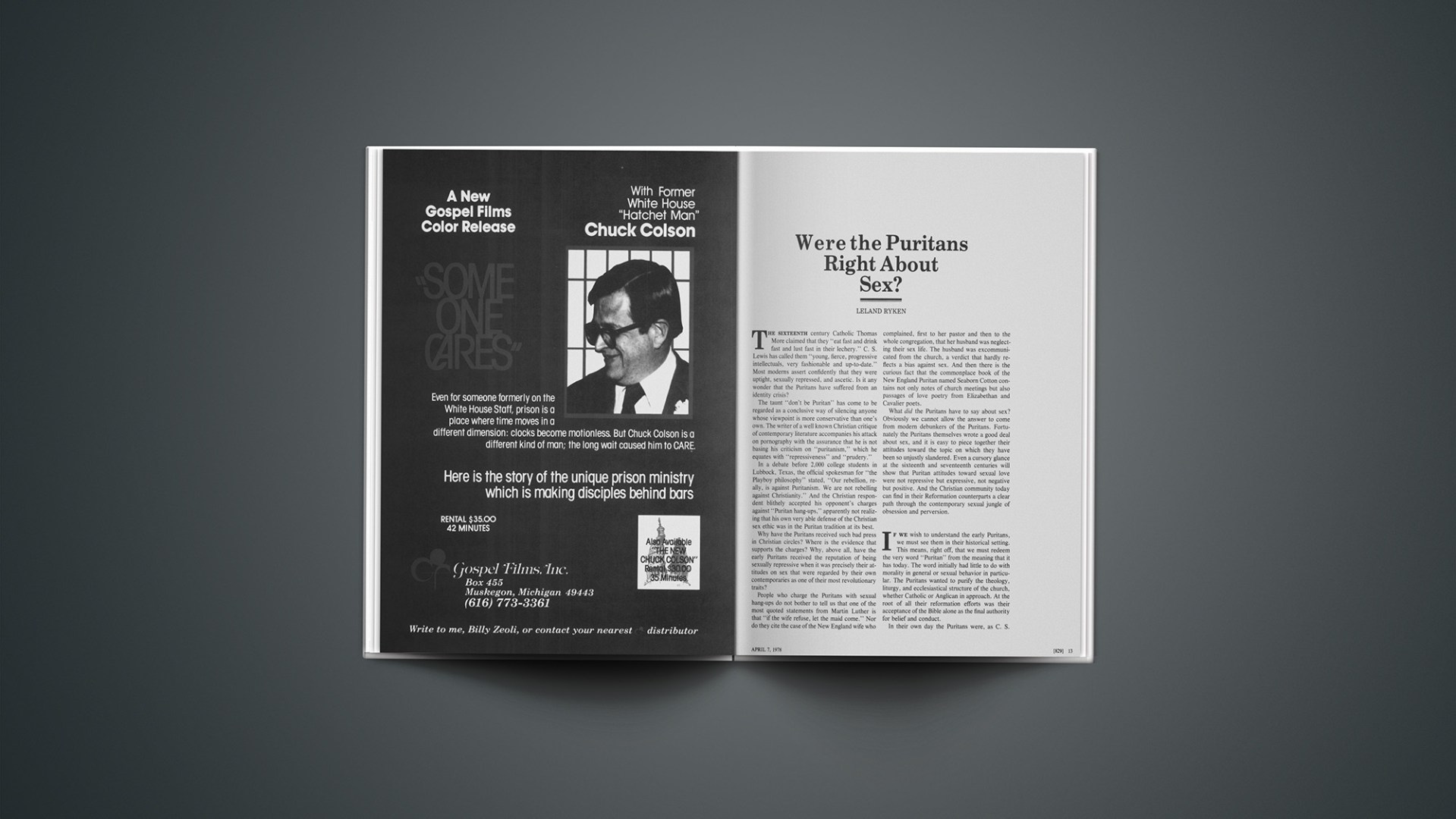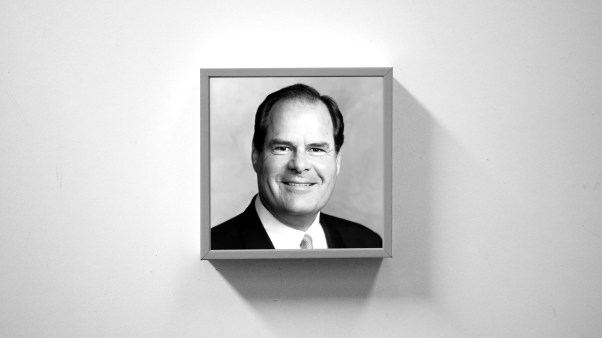The image is wrong.
The sixteenth century Catholic Thomas More claimed that they “eat fast and drink fast and lust fast in their lechery.” C. S. Lewis has called them “young, fierce, progressive intellectuals, very fashionable and up-to-date.” Most modems assert confidently that they were uptight, sexually repressed, and ascetic. Is it any wonder that the Puritans have suffered from an identity crisis?
The taunt “don’t be Puritan” has come to be regarded as a conclusive way of silencing anyone whose viewpoint is more conservative than one’s own. The writer of a well known Christian critique of contemporary literature accompanies his attack on pornography with the assurance that he is not basing his criticism on “puritanism,” which he equates with “repressiveness” and “prudery.”
In a debate before 2,000 college students in Lubbock, Texas, the official spokesman for “the Playboy philosophy” stated, “Our rebellion, really, is against Puritanism. We are not rebelling against Christianity.” And the Christian respondent blithely accepted his opponent’s charges against “Puritan hang-ups,” apparently not realizing that his own very able defense of the Christian sex ethic was in the Puritan tradition at its best.
Why have the Puritans received such bad press in Christian circles? Where is the evidence that supports the charges? Why, above all, have the early Puritans received the reputation of being sexually repressive when it was precisely their attitudes on sex that were regarded by their own contemporaries as one of their most revolutionary traits?
People who charge the Puritans with sexual hang-ups do not bother to tell us that one of the most quoted statements from Martin Luther is that “if the wife refuse, let the maid come.” Nor do they cite the case of the New England wife who complained, first to her pastor and then to the whole congregation, that her husband was neglecting their sex life. The husband was excommunicated from the church, a verdict that hardly reflects a bias against sex. And then there is the curious fact that the commonplace book of the New England Puritan named Sea born Cotton contains not only notes of church meetings but also passages of love poetry from Elizabethan and Cavalier poets.
What did the Puritans have to say about sex? Obviously we cannot allow the answer to come from modern debunkers of the Puritans. Fortunately the Puritans themselves wrote a good deal about sex, and it is easy to piece together their attitudes toward the topic on which they have been so unjustly slandered. Even a cursory glance at the sixteenth and seventeenth centuries will show that Puritan attitudes toward sexual love were not repressive but expressive, not negative but positive. And the Christian community today can find in their Reformation counterparts a clear path through the contemporary sexual jungle of obsession and perversion.
If we wish to understand the early Puritans, we must see them in their historical setting. This means, right off, that we must redeem the very word “Puritan” from the meaning that it has today. The word initially had little to do with morality in general or sexual behavior in particular. The Puritans wanted to purify the theology, liturgy, and ecclesiastical structure of the church, whether Catholic or Anglican in approach. At the root of all their reformation efforts was their acceptance of the Bible alone as the final authority for belief and conduct.
In their own day the Puritans were, as C. S. Lewis aptly puts it, “the very opposite of those who bear that name today.” They were the latest rave, definitely not old-fashioned or passé. They were the angry young generation demanding a clean sweep of the medieval past and a radical return to biblical Christianity.
This revolutionary attitude toward the Catholic past is the key to understanding the Puritan attitudes toward sex. The dominant attitude of the Catholic church throughout the Middle Ages and Renaissance was that sexual love itself was an evil and did not cease to be so if its object were one’s husband or wife. For Athanasius (fourth century) the supreme message of Christ was the need for virginity. In the same century Jovinian found himself excommunicated when he asserted that the married state was not inferior to virginity.
In the next century Tertullian and Ambrose preferred the extinction of the human race to its propagation through sin, that is, through sexual intercourse. For Augustine the sexual act was innocent in marriage but the passion that always accompanies it was sinful. Gregory the Great agreed, adding that whenever a husband and wife engaged in sexual intercourse for pleasure, their pleasure befouled their sexual act. Albertus and Aquinas objected to the sexual act because it subordinates the reason to the passions. St. Jerome said that the only good of marrige is that it produces virgins, and he also asserted that while there have been married saints, these have always remained virgins even in marriage.
Origen took Matthew 19:12 so literally that he was castrated before being ordained. Church fathers such as Tertullian, Chrysostom, Augustine, and Aquinas declared virginity superior to marriage, and the Council of Trent climaxed this tradition by denouncing people who denied that virginity was superior to the married state.
The medieval Catholic commentaries on early Genesis are a good index to the prevailing attitudes toward sex. St. Jerome argued that God refrained from pronouncing a blessing on the second day of creation because the number two prefigured marriage, which Jerome was sure had sinful associations. Chrysostom said that Adam and Eve could not have had sexual relations before the fall. Origen agreed, and he inclined toward the theory that if sin had not entered the world, the human race would have been propagated by some mysterious angelic manner rather than by sexual union. Bishop Gregory of Nyssa claimed that Adam and Eve had originally been created without sexual desire, and that if the fall had not occurred the human race would have reproduced itself by some harmless mode of vegetation.
I do not cite these examples in order to engage in some cheap laughs at the expense of the Catholic tradition, nor to imply that most modern Catholics are guilty of these negative attitudes toward sex. I do insist, however, that these Catholic attitudes of the Middle Ages are the necessary background against which we must understand early Puritan attitudes. In general, the Puritans affirmed what the Catholics denied and denied what the Catholics had traditionally affirmed. Many of the Puritan pronouncements, in fact, occur in head-to-head debates with Catholics.
After the Reformation broke in the early sixteenth century, Thomas More and the Puritan William Tyndale conducted a bitter printed debate about whether clergymen were free to marry. Tyndale argued not simply that ministers were free to marry but that Paul had commanded them to marry, citing verses such as First Timothy 3:2 (“Now a bishop must be … the husband of one wife”). It is instructive to note that More, with his Catholic views about penance and asceticism, regarded Tyndale’s Puritan theology as indulgent to the point of license, charging Protestants with “sensual and licentious living.”
Equally revealing is More’s run-in with Luther on the subject of sex and marrige. More regarded Luther’s marriage as an act of lechery, all the more offensive because Luther had married a nun. More spoke of Luther’s “abominable bitcheries” and called Luther’s views on married priests “abominable heresy.” More termed Luther himself “an open incestuous lecher.”
Luther’s reply in his Table-Talk gives some good glimpses into the Protestant reasoning about sex. Luther asks at one point, “On what pretence have they forbidden us marriage? ‘Tis as though we were forbidden to eat, to drink, to sleep.” What strikes one about the comment is its acceptance of the sexual appetite as a normal, God-ordained part of life, to be neither slighted nor exaggerated.
The Puritans were unanimous in declaring that the sex drive was created by God and is therefore good in principle. Calvin wrote that “conjugal intercourse is a thing that is pure, honorable and holy, because it is a pure institution of God.” “It is a foolish imagination,” Calvin writes elsewhere, “that celibacy is a virtue.” Luther regarded the sex drive as so strong and universal as to make marriage a virtual necessity. Bacon’s Book of Matrimony (1562) called marriage “an high, holy and blessed order of life, ordained not of man, but of God, … wherein one man and one woman are coupled and knit together, as one flesh and body.” The Puritan divine William Gouge, in commenting on Proverbs 5:18 (“rejoice in the wife of your youth, a lovely hind, a graceful doe”), writes that the hind and roe were chosen because of all beasts they were most enamored of their mates “and even mad in their … desire after them.”
In viewing sex as a God-implanted drive, the Puritans did not, of course, view sex as only a physical drive. For humans, they agreed, it is an expression of love and commitment as well as an appetite, and the Puritans romanticized sexual love in a way that removes it far from a merely animal urge. It is not often enough noted that the age of the Reformation was also the greatest age of love poetry in English literary history. The poets of the Middle Ages had first established romantic love as a leading literary subject, but the love that they portrayed was adulterous courtly love and never pretended to have the sanction of Christianity. “The conversion of courtly love into romantic monogamous love,” writes C. S. Lewis, was “largely the work of English, and even of Puritan, poets.”
What is the lesson to be learned from this huge body of love poetry? Simply that sexual love is, for people, more than an appetite, being a distinctly human experience and an expression of love. Perhaps this explains why the Song of Solomon exerted such a strong and steady influence on sixteenth-century English poetry, since that biblical work likewise puts sexual intimacy into a distinctly human, romantic context.
Because the Puritans viewed sexual intimacy as an expression of deeply felt love, they believed that its proper sphere was marriage. The Puritan ideal, in other words, was wedded romantic love. Whereas the Catholic tradition had praised virginity and deprecated marriage, the Puritans exalted marriage. The Catholic Erasmus had described as ideal a marriage in which husband and wife learn to live in sexual abstinence; John Cotton mentioned such a practice in a sermon only to denounce it, calling such an attitude toward sex the attitude “of a blind mind … not of that Holy Spirit, which saith It is not good that man should be alone.” The New England Puritan Thomas Hooker gave this picture of a husband infatuated with his wife.
“The man whose heart is endeared to the woman he loves … dreams of her in the night, hath her in his eye and apprehension when he awakes, museth on her as he sits at table, walks with her when he travels.… She lies in his bosom, and his heart trusts in her, which forceth all to confess, that the stream of his affection, like a mighty current, runs with full tide and strength” (quoted by Edmund S. Morgan in The Puritan Family, Trustees of the Boston Public Library, 1944, p. 26). This came from the pen of someone who, modern writers and speakers tell us foolishly, was inhibited in his romantic passion by a narrow theology.
Far from minimizing the importance of sex in marriage, the Puritans flaunted their enthusiasm for married sex. William Gouge called physical union “one of the most proper and essential acts of marriage.” The Puritan churchman Henry Bullinger cited First Corinthians 7:3–5 to support his claim that husband and wife are obligated to satisfy the sexual desires of the other. The Elizabethan Puritan Henry Smith regarded First Corinthians 7:3 as “a commandment to yield” the duty of sexual intercourse, “and not to do it, is a breach of the commandment.” William Whately declared regarding the sexual act that neither husband nor wife can “without grievous sin deny it.”
Although the Puritans placed sex within a context of marriage, they did not regard procreation as the only good reason for sexual relations between husband and wife. In this they differed from many of the Catholic churchmen. Augustine exerted a strong influence on the Catholic tradition when he asserted that the sexual act is free from sin only when its purpose is to produce offspring. Martin Luther had a different idea.
“Propagation is not in our will and power, for no parents are able to foresee whether … they will bring forth a son or daughter. My father and mother did not consider that they wanted to bring a Dr. Martin Luther into the world. Creation is of God alone and we are not able to perceive it.” (Tischreden; quoted by Roland Bainton in What Christ Says About Sex, Love, and Marriage, Association Press, 1957, p. 79). Similarly, John Milton observed that God ordained marriage “to comfort and refresh” man, “not mentioning the purpose of generation till afterwards.”
Mocked
St. Mark 15:16–20
Mocking the new boy on the block
with blind man’s bluff and other bully
games, the soldiers chased boredom
from the stagnant Jewish backwater,
inventively turning a routine job
into a back-slapping, not-to-be forgotten
revel. Later some would say
the victim, dressed up to look
like a king (whom they would kill
on the morrow) was the life of the party.
All the while they made their jokes
Another sat in the heavens and laughed,
holding his enemies in derision.
EUGENE H. PETERSON
If sexual love in its fullest meaning is an expression of love and commitment, it follows that sex in a loveless marriage is a kind of adultery. John Donne, a Protestant if not strictly a Puritan, made exactly this point in a sermon when he said that without “harmony of dispositions, … marriage is but a continual fornication, sealed with an oath.”
But the Puritans were prudes, right? Wrong. They insisted on the privacy of sex, not because they thought it wrong but because they thought it sacred. They knew that a sexual relationship is the least casual and most delicate of all human relationships to be entered into with one other person in a situation of deep personal commitment. Hence the Puritan emphasis on not flaunting one’s sexuality in public. Thomas Gataker was not prudish but convinced of the privacy of sex when he wrote that “the holy Ghost did allow … private dalliance and behavior to married persons between themselves.” Remembering that God had clothed the nakedness of Adam and Eve after the fall, Luther objected to the low necks worn by the girls of Wittenberg. And Milton, who went out of his way in Paradise Lost to insist on sexual love as part of the perfect marriage, at the same time draws our attention to the privacy of such a relationship; he describes Adam and Eve as not lacking “youthful dalliance as beseems/Fair couple, linked in happy nuptial league,/Alone as they.” The case against Playboy magazine, if we can trust the Puritans, is not that sex is wrong nor the feminine body unattractive; it is rather that sex is private, sacred, and more than an animal appetite for which persons may be used as pieces of equipment.
It is a commonplace that if one really wants to know the heart and soul of a culture, he can do no better than read its literature. In the stories and poems and plays of a culture you will find what, deep down, people were thinking and feeling. This will help to explain why the writings of two of the towering figures of English literature, Edmund Spenser and John Milton, are such useful repositories of Puritan attitudes toward sex.
Spenser was the foe of both asceticism and adulterous courtly love. He pays his disrespect to courtly love in his portrayal of the Bower of Bliss in Book II of The Faerie Queene. The Bower of Bliss represents excess, and in it Spenser portrays the whole sexual nature in disease. There is no genuine sexual fulfillment in the Bower, only female provocation and male prurience and voyeurism, the very ingredients of Playboy and related magazines.
Spenser’s ideal was chastity, by which he meant abstinence from sexual intercourse before marriage and active, devoted love after marriage. To show that his ideal was not abstinence, Spenser contrasted the Bower of Bliss to the Garden of Adonis (Book III of The Faerie Queene), a symbol of chaste married love. And what kind of’ place is it? A place of sexual pleasure—of “goodly merriment and gay felicity.” It is also a place of passion, where “sweet love” throws “gentle fits” among the lovers. It is a place of sexual union, where “frankly each paramour his sweetheart knows, each bird his mate.” The word “frankly” packs a lot of meaning in this context. It praises married love, which is based on a public avowal of love, and criticizes the courtly love tradition, which is as old as Proverbs (see especially 9:17) and as contemporary as today’s popular music and cinema, and which has for centuries been trying to titillate people’s sexual desires with the notion that secretive adulterous love is more exciting than married love.
Spenser’s ideal of wedded romantic love finds its most moving expression in the sonnet sequence that portrays his own courtship, and in his Epithalamion (“wedding song”) celebrating his own wedding. Sonnet cycles before Spenser had been addressed by poets to other men’s wives. By basing his sonnet sequence on the courtship that eventuated in his own marriage Spenser could not have been more original. He attained such distinctiveness, believe it or not, by being “Puritan.” The woman that Spenser’s sonnets praise is neither a disembodied spirit nor a body without a soul. She attracts the poet partly by her physical, sexual beauty. Yet this attractiveness belongs to her total person, something that is untrue when a woman draws attention to herself only as a sexual object.
Spencer’s Epithalamion is a concise and eloquent source for discovering Puritan attitudes toward sexual love. The poet praises his bride for both her physical beauty and her Christian virtue (“There dwells sweet love and constant chastity,/Unspotted faith and comely womanhood”). The celebration of the events of the wedding day includes a frank acknowledgment of sexual eagerness: “For greedy pleasure … / Thinks … upon her paradise of joys.” But the Puritan outlook was so integrated within itself that the poet can include also the prayer for a family of children “to increase the count” of “blessed Saints” in heaven.
In celebrating sexual love, Spenser illustrates well the domestic context in which the Puritans believed sex could flourish. Unlike the modern tendency to treat sex only as an appetite and to isolate it from the rest of human experience, the Protestant attitude, like the biblical, treats sex as part of a much bigger picture. Chad Walsh puts it well when, in contrasting the Christian attitude to that found in modern literature, he states that “when we are thinking normally we look at love, marriage, sex, parenthood, and child-rearing as one package.”
Milton’s Paradise Lost is a literary monument to Puritan beliefs on a number of topics, including sex. Milton disparaged the Catholic view that Adam and Eve did not consummate their love in Paradise. He portrays Adam and Eve as enjoying the delights of sexual love before the fall:
Straight side by side were laid, nor turn’d I ween
Adam from his fair spouse, nor Eve the rites
Mysterious of connubial love refused:
Whatever hypocrites austerely talk
Of purity and place and innocence,
Defaming as impure what God declares
Pure, and commands to some, leaves free to all.
Our Maker bids increase, who bids abstain
But our Destroyer, for the God and man?
[The Complete Poetical Works of John Milton, ed. by Douglas Bush, Houghton Mifflin, 1965;
Paradise Lost, Book IV, 11. 741–749].
Having thus dissociated himself from the Catholic tradition, Milton goes on to give his famous apostrophe to wedded love:
Hail wedded love, mysterious law, true source
Of human offspring, sole propriety
In Paradise of all things common else.
By thee adulterous lust was driven from men
Among the bestial herds to range, by thee
Founded in reason, loyal, just and pure,
Relations dear, and all the charities
Of father, son, and brother first were known.
Far be it, that I should write thee sin or blame,
Or think thee unbefitting holiest place,
Perpetual fountain of domestic sweets,
Whose bed is undefiled and chaste pronounced [IV, ll. 750–761].
All of the usual Puritan themes are here: the biblical basis (as evidenced by several biblical allusions) for affirming sex, the differentiation between animal lust and human love, the domestic context into which sexual fulfillment is put, and the privacy of the sexual relationship between two persons.
But didn’t the Puritans have rules against various sexual practices, and doesn’t this prove that they were opposed to sex? The answers are “yes” and “no,” respectively. The Puritans had strict taboos (and, when they were in power, civil laws) against sexual perversions, including adultery, lechery, homosexuality, and sexual idolatry. In this they were merely following the Bible. It is a curiously superficial view, currently popular, that when biblical and Puritan writers denounce sexual perversion they show a negative attitude toward sex. The reverse is true.
These writers are horrified by sexual perversion because they regard sex itself as good. Every culture protects what it regards as sacred with safeguards and taboos. A rule against stealing, for example, does not reflect a low view of property but a high view of it; the prohibition of murder shows that a society regards life as sacred rather than cheap. For the contrast to the biblical horror at sexual perversions one need only look at classical culture. Classical mythology is full of stories of illicit sexual capers and orgies among the gods and goddesses, and classical culture tended to have a low view of the physical appetites and of marriage.
Any attempt to understand the Puritan ideal of wedded love will lead ultimately to the cornerstone of all Puritan belief, the conviction that the Bible is the final authority for doctrine and conduct. It is, indeed, easy to list the biblical passages that the Puritan writers cited again and again in support of their beliefs. Genesis 1:27–28 was used to prove that God had created human sexuality and commanded men and women to reproduce. The Puritans also returned incessantly to Genesis 2:18–25 to support their view that God had ordained marriage between a man and woman as the perfect way of satisfying the sexual instinct. Preachers and commentators were zealous to call attention to Genesis 26:8, which describes Isaac’s fondling of Rebekah his wife; Luther said that the Holy Spirit recorded the incident in order to show that married sex is beautiful, and “how better to be expressed than by embracing?” Proverbs 5:15–20, which commands a husband to be infatuated with his own wife and avoid adultery, was expounded as a concise summary of the Bible’s teaching about the right and wrong ways to satisfy the sexual drive. The Puritans often allegorized the Song of Solomon so heavily that it ceased to be a repository of teaching about wedded physical love, but there were, happily, some who referred to it as providing instruction in perfect married love.
There were also some classic passages for the Puritans in the New Testament. Jesus’ attendance at the wedding in Cana and his quoting of Adam’s words in Genesis 2:24 (the quotations appear in Matthew 19:4–6 and Mark 10:6–9) were interpreted as Christ’s sanction of marriage. First Corinthians 7:1–5 produced a barrage of commentary about the obligation of husbands and wives to satisfy each other’s sexual needs. First Timothy 4:1–5, which denounces as “doctrines of demons” various ascetic ideas, including the forbidding of marriage, became a favorite passage to refute the Catholic teaching that ministers could not marry. Hebrews 13:4 may have been the most quoted text of all; in the King James Version it reads, “Marriage is honorable in all, and the bed undefiled: but whoremongers and adulterers God will judge.”
The Puritan ideal of sexual love between husband and wife arose as a reaction against an excessively negative attitude toward sex. Today the Puritan ideal stands as a corrective to the opposite extreme of total permissiveness and unbridled lust. Divorced from its context of love and armed with the seductive idea that it is wrong to restrain one’s natural impulses, sex has become a cultural obsession. The obsession has not brought freedom but bondage—bondage to sexual appetite, perversion, and the tendency to look upon people as sex objects.
D. Bruce Lockerbie is chairman of the Fine Arts department at The Stony Brook School, Stony Brook, New York. This article is taken from his 1976 lectures on Christian Life and Thought, delivered at Conservative Baptist Theological Seminary in Denver, Colorado.










